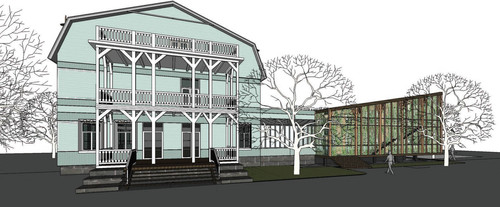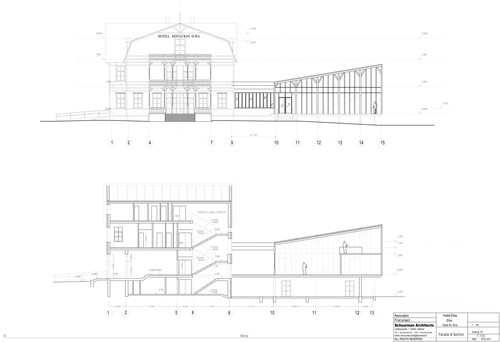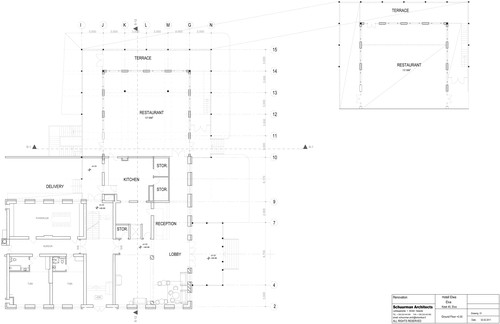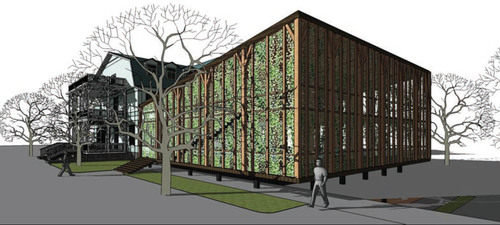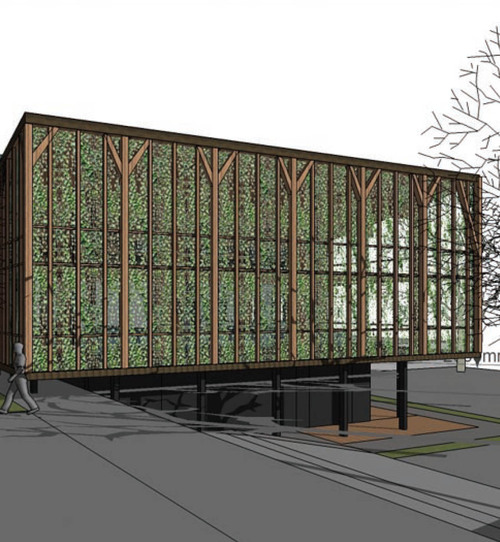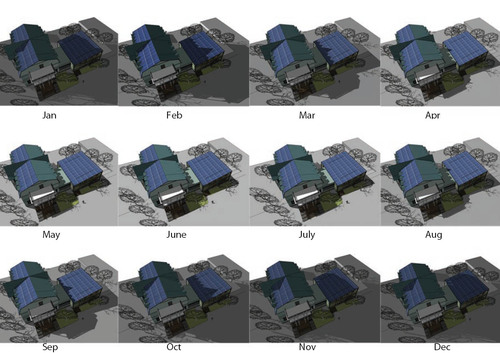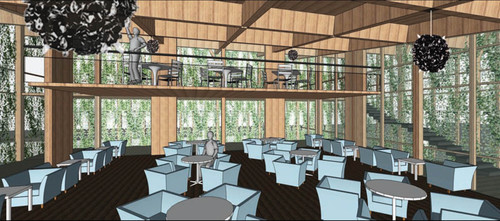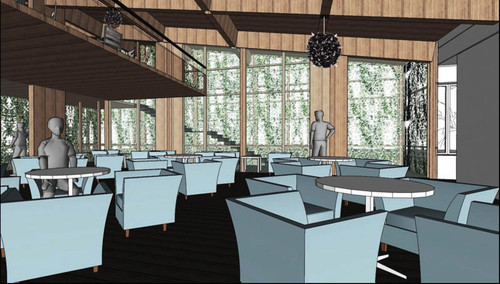HOTELL ELWA The Hotell Elwa is located in Elva, a small village in the souht of Estonia. The building dates from the beginning of the last century and being in a very bad shape, will be renovated and extended with a new restaurant wing with a large outside terrace. The Hotell Elwa has been a study project for sustainable building design, to achieve an emission-free, energy-saving building. Hereto the following ecological princibples were applied:
1. The restaurant terraces are at the NE and NW sides designed as a wintergarden. They form a buffer zone for the restaurant, which can therefore be less insulated. The wintergarden functions also as important part of the ventilation system, providing the restaurant with fresh air. 2. The roof of the building has been maximalised as location for the solar panels. The sun can reach the panels from the beginnng of February to the end of October (checked). 3. The desired roof terrace has found its place on the upper level of the wintergarden. It continues as a balcony in the restaurant. 4. The new building is extremely simple to build, without a heavy load on the roof. 5. The existing will be provided with the solar panels on the S.E.roof, but maybe also on the facades, 2nd floor between the windows (very effective).
Hotell Elwa, considerations for minimal energy consumption and emission reduction in outline: Sources of energy 1. Geothermal energy 2. Solar energy 3. Heat pumps 4. Wood 5. Oil 6. City heating 7. Electricity For the hotel, the following sources can be considered : 1. Geothermal energy is considered as very economical and could be used at least partially for the energy consumption of the hotel. 2. Solar energy is a very clean form of energy. Its use has been limited only by the price of the panels, but new types come on the market. The location in Elwa is quite good, the abundance of light during the summer months makes it comparable with Italy. and is better than middle Europe. The new DSC-solar panels, with titan surface layer, are provided with a pigment (colouring agent) and can be attached anywhere, even on windows. These elements work even on cloudy days, are not so effective as the traditional silicon panels, but much cheaper. Solar collectors should be used for heating hot water as energy source. Support from the EC for solar energy could be acquired. 3. The heat pumps, extracting energy from the air, are particular useful for the temporarily heating of spaces separately. 4. Heating with wood (pellets) can be considered, is quite good but not emission-free. 6. City heating is a new source of energy in Elwa, capacity to get from the city.
Recommendations for the hotel building . 1. The energy planning The total needed energy should be calculated by an energy expert and on base of the calculations different solutions for the energy package should be proposed. Also energy production should be investigated through the whole life cycle (LCC calculations). A energy-survey is to be made including: a) energy consumption of the building –> low energy building b) energy production on site (LCC calculations) c) net energy (electricity, city heating)
2. The building envelope Total zero emission is difficult achieve, but the envelop of the building should be as tight as possible : - Very careful designed wall and roofconstructions; with ecowool insulation the envelop should achieve an insulation factor of U=0.11 ...0.10 for walls, for the roof insulation U=0.06...0.08. The existing building will grow outwards some 300--400mm, architect drawings will include all wood profiles for the walls. Especially the window types, with the wall attachments, will be provided with necessary details. Window insulation value U=0.85 or better. Also the basement walls and floors to be insulated likewise. - Consider the design of a winter garden on the restaurant terraces at the NE and NW side.This will give the best insulation for the restaurant, creating use for the terrace-areas in the cold seasons. 3. Emission-free materials for the finishings of all surfaces, walls, floors and ceilings. 4. The ventilation planning, especially the heat recovery, is to be checked thoroughly according to the needs of the hotel. / Martinus Schuurman 09.06.2010
Outside view
Analysis
Inside view
|

